|
|
|
Sort Order |
|
|
|
Items / Page
|
|
|
|
|
|
|
| Srl | Item |
| 1 |
ID:
087322
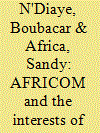

|
|
|
| 2 |
ID:
088933


|
|
|
|
|
| Publication |
2009.
|
| Summary/Abstract |
This article addresses the conflict over the Euphrates and Tigris waters from the perspective of negotiation theories, by examining the role of power in upstream/downstream negotiations. Conceptual and empirical links are established between water, negotiation (structure, process), power (asymmetries, coalition dynamics, strategies, development of alternatives) and security (direct/indirect interests such as national security, border security, territorial claims, economic development and environmental concerns). The study concludes that asymmetries in power have favored upstream/downstream interactions towards bilateral if not basin-wide arrangements. The framework shows that traditional elements of power, such as upstream positions, military and economic resources, do not constitute the only sources of power. Bargaining power can also determine the dynamics between respective riparians. Time constitutes an important source of power, and interests vary over time when political settings and security concerns shift. Downstream or more vulnerable riparians can invert situations of power asymmetry by acting on the basin-dominant riparian's interests and thus reduce its alternatives. Syria's use of 'issue-linkage' in its interactions with Turkey over water and wider security issues serves as the primary example.
|
|
|
|
|
|
|
|
|
|
|
|
|
|
|
|
| 3 |
ID:
178801
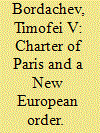

|
|
|
|
|
| Summary/Abstract |
The end of the Cold War opened up new vistas for building a new
international order in Europe, free of dividing lines. The more so since
the liberal world order, which emerged due to the evolution of the global
order in the field of security, on the one hand, and the rules, norms, and
practices established within the community of Western countries in 1945-
1991, on the other hand, was formally the most successful combination of
the effects of such categories as the balance of power and international
institutions. At the global level, this combination for a long time made
it possible to avoid revolutionary situations that might have been
caused by utter dissatisfaction of one or several major powers with their
position. However, in Europe, where the institutional basis of international interaction was most developed, the rules of the liberal world order
brought about significant distortions in favor of one of the participants
in this interaction—the European Union, which acted as an instrument for
increasing individual capabilities of major Western European countries.
This happened because the factor of military capabilities was excluded
from the overall balance of power of the main actors. Since for a long time
after the end of the Cold War Russia was limited in all factors of power
except for the military one, its position in relations with the EU was weak,
which is why its interests and values were ignored in building an EU-led
European order. This eventually paralyzed the entire system of multilateral
interaction in Europe, which, along with the shift of the global center of
power competition towards Asia, considerably marginalized the European
space in global affairs.
|
|
|
|
|
|
|
|
|
|
|
|
|
|
|
|
| 4 |
ID:
189227
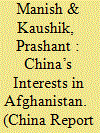

|
|
|
|
|
| Summary/Abstract |
Though long in the offing, US withdrawal from Afghanistan became a reality with the signing of the Doha Agreement on 29 February 2020, ultimately leading to the establishment of Taliban 2.0 in Kabul. The unravelling of the two-decade-old US-led war and reconstruction effort in Afghanistan led to a long-predicted scramble among the regional powers to fill the vacuum created by US withdrawal and threw up a plethora of intriguing questions, particularly regarding China’s role and interests in the region. This article seeks to understand and analyze China’s ever-growing engagement in Afghanistan through the paradigm of Realism, arguing that China has long-term geo-strategic and geo-economic interests in the region which requires it to coordinate more closely with Pakistan and Iran and innovate diplomatically. This article is divided into two sections. The first section focuses on China’s interests in Afghanistan viz. BRI-CPEC extension in Afghanistan, rare earth, and the need to ensure peace and stability. The second section assesses China’s response to the emerging situation by focusing on China’s engagement with the Taliban 2.0 and co-opting of Pakistan and Iran for safeguarding its long-term interests. This article concludes while looking at the position of India in the gamut.
|
|
|
|
|
|
|
|
|
|
|
|
|
|
|
|
| 5 |
ID:
176081
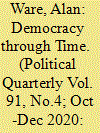

|
|
|
|
|
| Summary/Abstract |
Since the 1980s identities have re‐emerged as a powerful factor shaping support for specific public policies, often doing so at the expense of prioritising the interests of future generations. Outside the United States a major causal factor has been the declining ability of many political parties to mobilise support for themselves and their policies. Consequently, considerations derived from the past can be at the expense of future citizens. This article analyses two major policies separated by a century—Prohibition in the US and Brexit. With both, the enacted policies featured limited previous public discussion about their likely consequences. Moreover, in both cases it was a ‘hard’ version that would be enacted, even though some supporters had favoured more moderate policy options. While not all policies driven by support from particular identities harm future generations, some do. This results from politicians in public utterances previously being insufficiently focussed in detail on the policy’s consequences.
|
|
|
|
|
|
|
|
|
|
|
|
|
|
|
|
| 6 |
ID:
157654


|
|
|
|
|
| Summary/Abstract |
The article examines each of the BRICS countries' interests in East Asia considered separately and in the format of an informal interstate association. The author analyzes differences in their intentions as individual subjects of international relations and in the context of BRICS interests as an integral interstate association.
|
|
|
|
|
|
|
|
|
|
|
|
|
|
|
|
| 7 |
ID:
146454


|
|
|
|
|
| Summary/Abstract |
As the WTO’s Dispute Settlement Body (DSB) gains relevance as a rule-maker in trade governance, understanding the reform negotiations addressing its legal framework becomes increasingly important. This article examines how domestic ideas and interests affect the reform positions of two of the DSB’s most active users, emerging power states Brazil and India. Regarding domestic interests, I draw on the domestic politics and two-level games literatures to argue that the amount and favorability of domestic sectors’ experience with the DSB affects their incentives to lobby during the reform negotiations. Interestingly, this results in countries pursuing liberal interests within negotiations, despite having conflicting domestic interest preferences overall. Regarding domestic ideas, I find evidence that Brazilian and Indian politicians feel accountable to voters in the negotiations, contradicting claims to the contrary in the literature. This highlights the need for more research illustrating links between voters and officials in this context.
|
|
|
|
|
|
|
|
|
|
|
|
|
|
|
|
| 8 |
ID:
151603
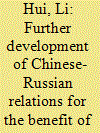

|
|
|
|
|
| Summary/Abstract |
CHINESE-RUSSIAN FRIENDSHIP is deeply rooted in historical realities. The People's Republic of China was proclaimed on October 1, 1949. On the next day, the PRC and the USSR established diplomatic relations, and the Soviet Union became the first country to officially recognize new China. During those years, Chinese-Soviet, and subsequently Chinese-Russian relations went through many trials and stood the test of time. Being stable, robust, and mature, they have become a model of intergovernmental relations in the modern world. Chinese-Russian relations have been currently going through the most favorable period in their history, maintaining their high level and thus benefitting the peoples of both countries.
|
|
|
|
|
|
|
|
|
|
|
|
|
|
|
|
| 9 |
ID:
142263
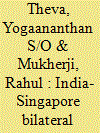

|
|
|
|
|
| Summary/Abstract |
This paper is a critical historical analysis of the trajectory of geo-political and economic relations between India and Singapore. This paper argues that India’s perception of its interests and its geopolitical orientation towards the Cold War prevented India’s security and economic integration with Southeast Asia. Apart from geopolitics, the economic orientation of India was also a critical factor that influenced the trajectory of India – Singapore economic engagement. However, there was a dramatic change after the Cold War ended. The structural change from bi-polarity towards a unipolar moment transformed both geopolitics and economic engagement. Moreover, India’s own economic orientation had also changed by the end of the Cold War. In sum, this paper attempts to elucidate upon how ideas construct economic and political interests and how geopolitical interests, once constructed, drive economic relations.
|
|
|
|
|
|
|
|
|
|
|
|
|
|
|
|
| 10 |
ID:
087300
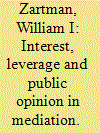

|
|
|
|
|
| Publication |
2009.
|
| Summary/Abstract |
Saadia Touval's important contributions to the study of mediation included an emphasis on the interests and motivations of mediators, hitherto often assumed to be pure or non-existent. As a result, legitimacy is usually considered to be inherent in the selfless mediator, although in internal affairs, mediation is illegitimate meddling. At the same time, much of the work on mediation either exaggerates or underestimates the nature of leverage. Public opinion also has an important but ambiguous relation to mediation. Interests, public opinion and leverage were topics where Touval helped to establish a more realistic appreciation, as illustrated in this second commemorative issue of International Negotiation.
|
|
|
|
|
|
|
|
|
|
|
|
|
|
|
|
| 11 |
ID:
152890
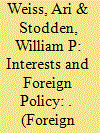

|
|
|
|
|
| Summary/Abstract |
In this article, we test one explanation of the causes of adoption of destabilization as a foreign policy. Destabilization, a risky policy which targets the political leadership of another sovereign state, is a widely-used foreign policy practice. But under-conceptualization, specifically around the causes of destabilization, has thus far limited its use in scholarly analysis of foreign policy. This paper aims to remedy that deficiency. Building on Taliaferro's (2004) balance-of-risk theory, we examine the rapid decay and adoption of destabilization in relations between the US and Cuba as a critical empirical test of this theory. We argue that the risky decision to adopt destabilization is the result of perceived crisis of security, economic and ideological interests. Our findings have implications for other scenarios and times, because they provide a better understanding of destabilization as a practice of governments against one another.
|
|
|
|
|
|
|
|
|
|
|
|
|
|
|
|
| 12 |
ID:
172423


|
|
|
|
|
| Summary/Abstract |
Ideational variables have frequently been employed in positivist-minded and materialist analyses of state behaviour. Almost inevitably, because of these commitments, such studies run into theoretical challenges relating to the use of ideas. In this article, I suggest that integrating ideational factors in positivist and materialist approaches to state behaviour requires: (1) distinguishing conceptually between interests and ideation as well as between individual beliefs and social ideas; and (2) addressing challenges of operationalisation and measurability. To that end, I employ neoclassical realism as a case study. I argue that a re-conceptualisation of ideas as externalised individual beliefs employed in political deliberation allows neoclassical realists to focus on how ideas and ideational competition intervene in the transmission belt from materially given interests to foreign policy choice. At the same time, it more clearly operationalises ideas as identifiable in language and communication. I suggest this reconceptualisation, while consistent with realist paradigmatic assumptions, need not be limited to neoclassical realism. Instead, transposed to different paradigms, it would similarly allow positivist-minded constructivists and institutionalists to avoid a conceptually and methodologically awkward equation of different ideational factors.
|
|
|
|
|
|
|
|
|
|
|
|
|
|
|
|
| 13 |
ID:
162814


|
|
|
|
|
| Summary/Abstract |
THE RUSSIAN REVOLUTIONS of February and October 1917 have been a subject for century-long discussions. There exists a large diversity of studies that delve into domestic, regional and international impacts of the revolutions. This article sums up a paper delivered to an international scholarly conference on the significance of the Russian revolutions of 1917. This conference marking 100th anniversary of these revolutions was held in St. Petersburg on November 2-3, 2017. In this article, the present writer analyzes the role of the Russian revolutions in international diversification and argues that the year 1917 should be considered the starting point of the confrontation between world development models propounded by Russia and the United States.
|
|
|
|
|
|
|
|
|
|
|
|
|
|
|
|
| 14 |
ID:
139600
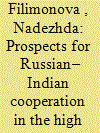

|
|
|
|
|
| Summary/Abstract |
The paper examines emerging prospects for Russia–India cooperation. While the two countries can collaborate in various areas of mutual interest, the paper identifies possible challenges and effects on the cooperation in the Arctic region. The sanctions imposed by the West could impede Russian energy projects in the Arctic. This could force the state to find a way to replace Western technologies through enhancing capacities of national industry and developing cooperation with other states, including Asian countries. This shift is also bolstered by the political interest to strengthen the position of Russia in the Asian region as a whole, and to increase the country's energy security. The paper provides an overview of the Russian and Indian interest and policy in the Arctic, and presents the perspectives and challenges for both countries.
|
|
|
|
|
|
|
|
|
|
|
|
|
|
|
|
| 15 |
ID:
155774
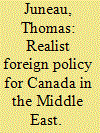

|
|
|
|
|
| Summary/Abstract |
Canada’s policies in the Middle East receive large amounts of media attention, but there is surprisingly little scholarly work about them. Of the few studies on the topic, moreover, most focus on analyzing past or current policies. This is certainly useful, but there is virtually no academic work focused on prescription. There is, as such, a need for theoretically informed studies laying out the rationale for a sound Canadian policy framework for the region. In this context, this paper proposes to look at Canada’s Middle East policies from a realist perspective. What are Canada’s interests? How should these translate into policy? The goal here is not to make specific prescriptions regarding each conflict or bilateral relation, but rather to propose a comprehensive framework to guide Ottawa’s broad approach to the Middle East.
|
|
|
|
|
|
|
|
|
|
|
|
|
|
|
|
| 16 |
ID:
186602


|
|
|
|
|
| Summary/Abstract |
The aim of the study is to identify the role of the People’s Republic of China in the activities of the organisation, based on the Chinese vision of its role in the Shanghai Cooperation Organisation as one of the ideological and philosophical leaders that determine its focus and ideology. In particular, China implements the principle of polycentrism in Eurasia and interstate partnership and promotes the idea of state-regulated economic globalisation. The methodology of this scientific research is based on the analytical method of studying the issues related to the topic of the scientific research. China proceeds from the concept of ensuring full sovereignty by the member states of the organisation, but against the backdrop of low development rates of national economies (up to 2–2.5%) and lack of awareness by countries of their national interests in the region, Chinese business will strengthen its expansion, relying on both the World Trade Organisation rules and using protectionist measures by absorbing ineffective business entities. China is guided by the principles of non-interference in the internal affairs of other states, while maintaining its socio-political model based on the fusion of the communist ideology and the traditional philosophical doctrines of China and the mentality of the country’s population, excluding the democracy export policy, denying the desire for undivided hegemony and to rule the world community. This is confirmed by the main key elements of the People’s Republic of China’s foreign policy, determined by the Chinese leadership.
|
|
|
|
|
|
|
|
|
|
|
|
|
|
|
|
| 17 |
ID:
164051


|
|
|
|
|
| Summary/Abstract |
This article analyzes development prospects of relationsbetween Russia and Japan as Japanese diplomacy toward Russia becomesmore active. In May 2016, Prime Minister S. Abe put forward an eight-pointcooperation program. More than 100 economic agreements have been signedwithin the framework of that program; however, most of them have not beenimplemented. The author examines the reasons for failure of these bilateral This article analyzes development prospects of relationsbetween Russia and Japan as Japanese diplomacy toward Russia becomesmore active. In May 2016, Prime Minister S. Abe put forward an eight-pointcooperation program. More than 100 economic agreements have been signedwithin the framework of that program; however, most of them have not beenimplemented. The author examines the reasons for failure of these bilateral relations to develop.
|
|
|
|
|
|
|
|
|
|
|
|
|
|
|
|
| 18 |
ID:
141501


|
|
|
|
|
| Summary/Abstract |
Inclusive institutions make correct policy choices required for steady catch-up growth more likely. India started out with highly inclusive political institutions since it adopted democracy with universal suffrage at independence. But extractive economic institutions, inherited from the British, were made more so by economic controls. In addition, a heterogeneous electorate allowed politicians to cultivate vote-banks and populist schemes instead of delivering better public services and governance. India’s opening out was adequately nuanced and flexible but was sometimes used as a substitute for harder domestic reforms. It, however, added to the growing constituencies that benefit from growth, and are pushing for more inclusive productivity enabling economic institutions. Broader interest groups create better institutions and incentives. Examples from general governance, the regulation of industry, and agricultural marketing show the process, although messy and prolonged, is in the right direction.
|
|
|
|
|
|
|
|
|
|
|
|
|
|
|
|
| 19 |
ID:
116594


|
|
|
|
|
| Publication |
2012.
|
| Summary/Abstract |
Gans' (2012; Against culture versus structure. Identities: Global Studies in Culture and Power, 19 (2), 125-134) indictment of cultural sociology (CS) and his anointment of structural sociology would have us believe the two are incommensurate paradigms. I do not agree. I deconstruct this binary with theory and empiricism from the intersection of CS and the sociology of race and ethnicity (SRE). First, I redefine the project of CS, contra Gans' interpretation. Second, I refute Gans' assumption that 'CS is not much interested in cultural processes' by demonstrating how CS is concerned with the process and action of the material and symbolic aspects of social life. Third, I examine why well-placed trepidation over 'culture of poverty'-style explanations may influence a negative view of CS/SRE. Fourth, I map advances birthed from the CS/SRE connection that contest Gans' assertion that 'CS has not paid much attention to policy'. And fifth, I show how CS avoids tautological arguments in which culture would be 'its own cause'.
|
|
|
|
|
|
|
|
|
|
|
|
|
|
|
|
| 20 |
ID:
184080
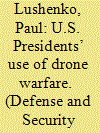

|
|
|
|
|
| Summary/Abstract |
Scholars often reduce America's use of drones to a bureaucratic process. While this enables them to recognise shifts in America's use of strikes since 2002, they cannot adequately explain such change over time. Rather, I argue that America's use of strikes is a function of presidents' decisions. Presidents adopt strategic and legal-normative cognitive frames that shape their decisions to use strikes. I use this typology to study crucial and pathway cases during the Obama and Trump administrations. I show that presidents' decisions to use drones are made to achieve state and social goals. The balance between these aims is informed by, and constitutive of, presidents' strategic and legal-normative frames. Understanding America's use of drones as a leader-driven practice suggests that the legitimacy of strikes may relate more to their impact on the relationship between norms and interests, and not the military or political nature of targets, as some ethicists claim.
|
|
|
|
|
|
|
|
|
|
|
|
|
|
|
|
|
|
|
|
|